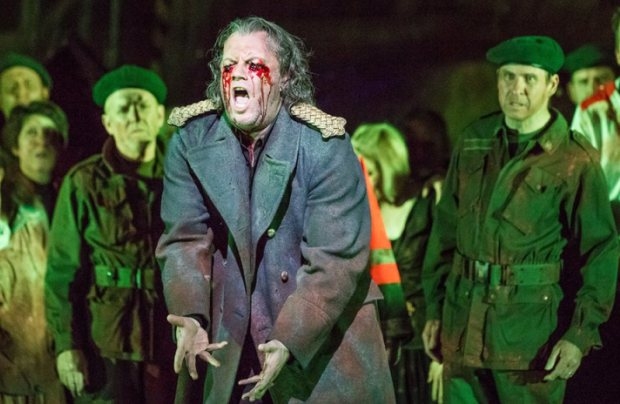Oedipe (Royal Opera House)

© Alastair Muir
We'll be talking about the opening tableau for years to come. As the overture to this half-forgotten opera strikes up, the light on the decorated drop curtain—a detailed, densely populated fresco—begins to glow and intensify into 3D relief. It's a trompe-l'oeil. Then it starts to sing…
Dazzling though that moment is, as are the many other effects by set designer Alfons Flores and lighting designer Peter van Praet, it never overpowers the music nor distracts from the unfolding drama. The production by Alex Ollé and Valentina Carrasco is so well attuned to George Enescu's score that all the strands plait themselves into a single entity.
Oedipe, in short, is a triumph.
Not only do the composer and his librettist, Edmond Fleg, transmute the two plays of Sophocles, Oedipus Tyrannus and Oedipus at Colonus, into their opera, they also dramatise the back-story. So the first two acts physically portray events that are usually only discussed, from the birth of Oedipus and the terrible prophesy that he will kill his father and marry his mother, through his exile and upbringing to his slaying of the Sphinx and his arrival in Thebes to a hero's welcome.
The opera's one glaring fault is that all these events are then re-reported in the later acts, in line with the familiar plays. At the turn of an interval we lurch from closely observed mayhem to the ritualised world of Greek tragedy with the unities of time, place and action scrupulously observed. Yet Enescu's music is so rich and the libretto so refreshingly economical that even this succeeds. It's no masterpiece, then, but a gripping work with a gorgeous, edible score.
'Near the very top of opera's tree'
While the meat of the drama is rendered in neo-Romantic tones, it often feels unmistakably French—and not merely because of the sung language. The Moldavian Enescu, like his contemporary Stravinsky, was an outsider who made his reputation in Paris and absorbed its musical perfumes. At times, indeed, the choral writing in Oedipe (1920s) strongly anticipates the mood of his Russian colleague's Perséphone a decade later.
The excellent young conductor Leo Hussain weaves this material into a seductive whole and allows his myriad singers to shine. Distinguished figures like Alan Oke and Nicolas Courjal come and go, Sarah Connolly lends a dignified devastation to Oedipe's wife/mother, Jocaste, and Marie-Nicole Lemieux descends like Tina Turner in a heavenly aeroplane for her cameo as the seductive Sphinx. The Royal Opera Chorus relishes a work that gives it plenty of scope; Ollé and Carrasco's silent actors, for their part, seem to have been chosen for their ability to remain still for long periods.
It is Johan Reuter who carries the evening as poor, doomed Oedipe. In outstandingly fine voice, the Danish baritone builds and sustains a performance of harrowing ferocity until, pacified by the unconditional love of his daughter Antigone (Sophie Bevan), he eventually finds peace in music of the sweetest serenity.
While not everything is perfect (at one extreme we have to accept an ill-judged example of sentimental casting; at the other Hubert Francis as Laïos really shouldn't hold a newborn baby by its legs) there's enough about this inspired staging to place it near the very top of opera's tree.
With only five more scheduled performances, audiences should be beating down the doors to see Oedipe. And if you need a clincher, go for the water vapour effects. They're as mysterious as they are magical.
Oedipe continues in repertoire at the Royal Opera House until 8 June.










